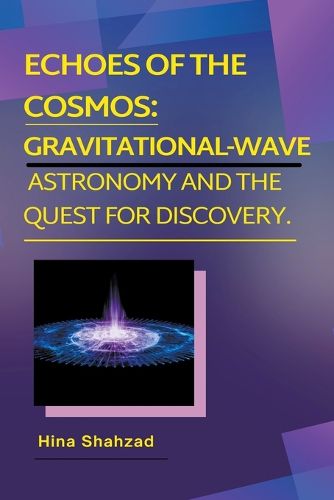Readings Newsletter
Become a Readings Member to make your shopping experience even easier.
Sign in or sign up for free!
You’re not far away from qualifying for FREE standard shipping within Australia
You’ve qualified for FREE standard shipping within Australia
The cart is loading…






This title is printed to order. This book may have been self-published. If so, we cannot guarantee the quality of the content. In the main most books will have gone through the editing process however some may not. We therefore suggest that you be aware of this before ordering this book. If in doubt check either the author or publisher’s details as we are unable to accept any returns unless they are faulty. Please contact us if you have any questions.
Discovering the Universe: A Primer on Gravitational-Wave Astronomy
Over the course of the universe's long history, researchers have persistently sought out new explanations for the phenomena they find puzzling. Recently, gravitational-wave astronomy has emerged as one of the most revolutionary fields in astrophysics. To probe the cosmos, gravitational-wave astronomy looks for ripples in spacetime rather than the electromagnetic waves used by conventional astronomical studies.
In his 1915 General Theory of Relativity, Albert Einstein foretold the possibility of gravitational waves, which are actually ripples in spacetime curvature brought about by the acceleration of large objects. But technology finally caught up with theory after nearly a century, and in 2015, gravitational waves were directly detected for the first time. By revealing cosmic events that had hitherto eluded conventional observational techniques, this great accomplishment ushered in a new age in astronomy.
The Basics of Gravitational Waves
Like ripples in a pond, gravitational waves are disruptions in the curvature of spacetime that travel at the speed of light. Merging black holes or neutron stars, which are large objects with enormous gravitational fields, accelerate and produce them. Gravitational waves are a kind of energy emission from moving or interacting celestial bodies. These waves carry information about the events that caused them to propagate.
$9.00 standard shipping within Australia
FREE standard shipping within Australia for orders over $100.00
Express & International shipping calculated at checkout
This title is printed to order. This book may have been self-published. If so, we cannot guarantee the quality of the content. In the main most books will have gone through the editing process however some may not. We therefore suggest that you be aware of this before ordering this book. If in doubt check either the author or publisher’s details as we are unable to accept any returns unless they are faulty. Please contact us if you have any questions.
Discovering the Universe: A Primer on Gravitational-Wave Astronomy
Over the course of the universe's long history, researchers have persistently sought out new explanations for the phenomena they find puzzling. Recently, gravitational-wave astronomy has emerged as one of the most revolutionary fields in astrophysics. To probe the cosmos, gravitational-wave astronomy looks for ripples in spacetime rather than the electromagnetic waves used by conventional astronomical studies.
In his 1915 General Theory of Relativity, Albert Einstein foretold the possibility of gravitational waves, which are actually ripples in spacetime curvature brought about by the acceleration of large objects. But technology finally caught up with theory after nearly a century, and in 2015, gravitational waves were directly detected for the first time. By revealing cosmic events that had hitherto eluded conventional observational techniques, this great accomplishment ushered in a new age in astronomy.
The Basics of Gravitational Waves
Like ripples in a pond, gravitational waves are disruptions in the curvature of spacetime that travel at the speed of light. Merging black holes or neutron stars, which are large objects with enormous gravitational fields, accelerate and produce them. Gravitational waves are a kind of energy emission from moving or interacting celestial bodies. These waves carry information about the events that caused them to propagate.